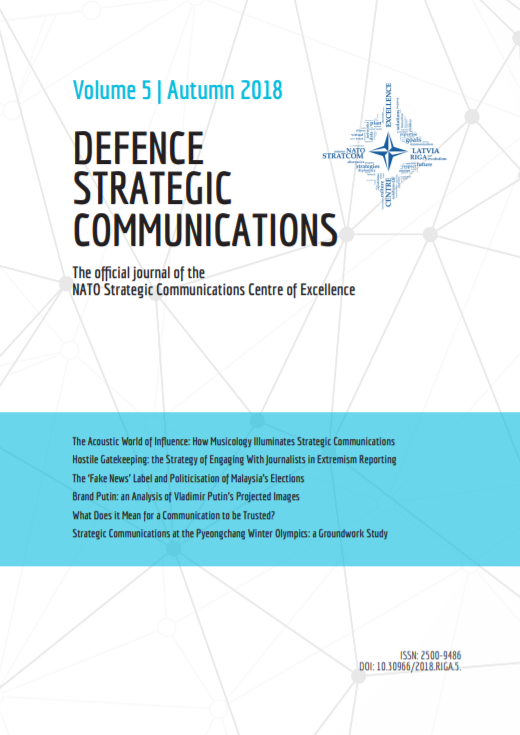STRATEGIC COMMUNICATIONS AT THE PYEONGCHANG WINTER OLYMPICS: A GROUNDWORK STUDY
STRATEGIC COMMUNICATIONS AT THE PYEONGCHANG WINTER OLYMPICS: A GROUNDWORK STUDY
Author(s): Nicholas Michelsen, Jonathan WoodierSubject(s): Media studies, Communication studies, Government/Political systems, Sports Studies
Published by: NATO Strategic Communications Centre of Excellence
Keywords: PyeongChang Winter Olympics; Kim Jong-un; Moon Jae-in; Donald Trump; North Korea; South Korea; China; strategic communications;
Summary/Abstract: This article draws on content and sentiment analysis of a sample of international English-language media reports to identify the core elements of the Democratic People’s Republic of Korea (DPRK) strategic communications campaign conducted at the PyeongChang Winter Olympics, and to establish groundwork for an assessment of its effectiveness. Using the Olympics as a stage for strategic communications is as old as the games themselves. The article examines the structure and elements of a DPRK Strategic Communications campaign by locating it in historical and theoretical context, and shows how it bears the hallmarks of a carefully crafted and timed agenda-setting campaign. Subsequent to the games, the supreme leader of the DPRK, Kim Jong-un, met with President Moon Jae-in of South Korea, to discuss a full peace treaty and, in June 2018, met with President Trump of the United States. Irrespective of the ultimate outcome of these engagements, a month before the games such a meeting would have been inconceivable. We contend that the 2018 Winter Olympics held in the Republic of Korea (ROK) provides a case study for assessing how influencing discourses in the media space may impact the conditions of possibility for international political action.
Journal: Defence Strategic Communications
- Issue Year: 5/2018
- Issue No: 5
- Page Range: 215-250
- Page Count: 36
- Language: English

